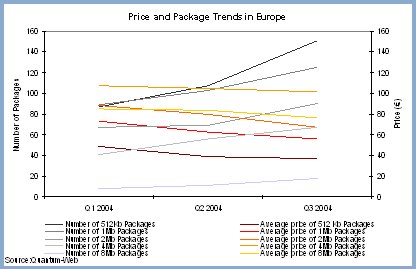A new report, the European Broadband Pricing Report, researched by Quantum Web and distributed by BroadGroup, shows European broadband pricing (of speeds between 0.5Mbps and 2Mbps) dropping since January 2004 by around 23%. The numbers of supplier and packages available have increased considerably over this period with 0.5Mbps tariffs availability increasing 75%.
455 tariffs offered by 109 operators over 36 European countries were examined over the first three quarters of this year (2004).
At the higher speeds, 4Mbps and 8Mbps the price reductions have been less dramatic. Clearly at this premium-end of the market there is little competition and in their words “[leaves] more room for price elasticity for content providers.”
It’s interesting to note that non-DSL products make up 20% of the European market.

We find it surprising that, given the intense competition at the 0.5Mbps level, pricing hasn’t come down more than at 1 and 2Mbps levels. We wonder if this is due to the majority of connections being provided by wholesalers to markets, such as BT Wholesale in the UK. Without competition at this level, these wholesalers (normally the incumbent telco) don’t have much impetus to lower their prices dramatically, just gradually, to keep their telecoms regulator from getting angry.
When we asked the BroadGroup about pricing across the surveyed countries they said there was a considerable difference. Generally, the previous Eastern European counties have lower pricing, as do many of the Scandinavian countries. To us this points towards major fibre optic network runs equalling lower prices, as most of the former Eastern Europe frog leapt mainland Europe by replacing their antiquated phone system with fibre. Scandinavia is well known for their wisdom in laying copious amount of fibre. We suggest that those trying to make their countries competitive both in terms of the obvious – IT, and the less obvious – digital entertainment networks, pay attention.